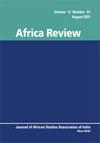Leadership–followership disconnect and democratic decline in Nigeria
IF 0.5
Q4 AREA STUDIES
引用次数: 1
Abstract
ABSTRACT Leadership dispositions in politics determine, to a large extent, the direction, nature and character of democracy and electoral politics. For a long time, Nigeria has had power-mongering leadership, whose dispositions have redefined followership behaviour. Leadership–followership disconnect has impacted on democracy. Consequently, democracy in Nigeria operates in breach of its tenets. Most elections in Nigeria are synonymous with insidious violence, which have attracted the attention of scholars with insightful analyses. However, there has to date been little systematic evaluation of the primary factors accounting for democratic decline in Nigeria with particular regard to leadership–followership dialectic. This article interrogates the relationship between leadership dispositions and followership behaviour and the effect on democracy. Using content analysis, this article finds evidence that leadership–followership disconnect is the most important factor accounting for democratic decline in Nigeria. The findings are relevant both for understanding the dynamics of leadership–followership disconnect and its impact on democracy in Nigeria.尼日利亚的领导与追随者脱节和民主衰落
政治中的领导倾向在很大程度上决定了民主和选举政治的方向、性质和特征。很长一段时间以来,尼日利亚的领导层都是权力贩子,他们的性格重新定义了服从行为。领导与追随者之间的脱节影响了民主。因此,尼日利亚的民主制度违背了其原则。尼日利亚的大多数选举都是阴险暴力的代名词,这引起了学者们的深刻分析。然而,迄今为止,对尼日利亚民主衰落的主要因素,特别是对领导-跟随关系辩证法,几乎没有进行系统的评价。本文探讨了领导倾向和追随行为之间的关系以及对民主的影响。利用内容分析,本文发现证据表明,领导与追随者脱节是导致尼日利亚民主衰落的最重要因素。这些发现对于理解领导与追随脱节的动态及其对尼日利亚民主的影响都是相关的。
本文章由计算机程序翻译,如有差异,请以英文原文为准。
求助全文
约1分钟内获得全文
求助全文
来源期刊

Africa Review
AREA STUDIES-
CiteScore
1.80
自引率
12.50%
发文量
22
期刊介绍:
Africa Review is an interdisciplinary academic journal of the African Studies Association of India (ASA India) and focuses on theoretical, historical, literary and developmental enquiries related to African affairs. The central aim of the journal is to promote a scholarly understanding of developments and change in Africa, publishing both original scholarship on developments in individual countries as well as comparative analyses examining the wider region. The journal serves the full spectrum of social science disciplinary communities, including anthropology, archaeology, history, law, sociology, demography, development studies, economics, education, gender studies, industrial relations, literature, politics and urban studies.
 求助内容:
求助内容: 应助结果提醒方式:
应助结果提醒方式:


